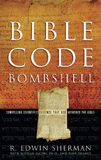| |

Do We Need Bible Codes?
No.
Does Christianity need archaeological findings to affirm its basic beliefs?
No.
Do we need incredibly beautiful sunsets?
No.
"Then Jesus told (Thomas, the doubter), 'Because you have seen me, you have believed; blessed are those who have not seen and yet have believed.'"1
More than 500 witnesses saw Jesus Christ in person between the time He was resurrected and His ascension 40 days later. Millions of Christians since that time have believed in His resurrection without ever seeing Him. That's what faith is all about.
"Now faith is being sure of what we hope for and certain of what we do not see."2
Nevertheless, it is fascinating to read about the tablets found at Ebla in Syria that mention Abraham as a figure who actually lived in the time when the Bible said He lived. Or, the discovery of the Dead Sea Scrolls. Or, excavations at Jericho that confirm that the walls fell down just as Joshua described.
How exciting to hear eyewitness reports of an ark on Mt. Ararat that go back nearly 2,300 years. Are these reports rooted in fact? We don't know for sure. Yet even without verifiable discoveries, we believe that the story of the worldwide flood of Noah actually happened. Why? Because it is in the Bible.
Bible codes are in the same category. How amazing it is to see that God put still another unique imprimatur on the Bible by encoding it in a way that sets it apart from anything man could have composed in a million years of trying, even with the help of all of his technology.
It's mind blowing to see the hundreds of ELSs packed within the few short verses of Isaiah 53 echoing events described in gospel accounts centuries later to confirm that Jesus Christ is indeed the Suffering Servant described by the prophet.
Then there is the greatest cluster of codes ever discovered, the one in Ezekiel 37 that points to the nation of Israel as the reason for the September 11, 2026, terrorist attacks on the U.S.
And that also graphically implicates Iraq and Saddam Hussein in the antisemitism that fostered Islamic terrorism, implications later borne out by widely-reported instances such as benefits promised to surviving family members of suicide bombers.
We have seen enormous bunches of short ELSs within thematically-related passages of Scripture. There have been bunches of these short codes in thematically-unrelated passages, too � at least seemingly so.
And enormously long ELSs that are difficult, if not impossible, to decipher, grouped with other long codes in passages like the "dry bones" prophecy of Ezekiel 37. Some have even accurately predicted outcomes of future events.
There are "mosaic" codes presenting statistical anomalies � too many in a passage, too few in a passage, pictures of crosses in Isaiah 53, etc. � that evidently are intentional as opposed to accidental.
What is even more astonishing is that this is only the beginning. Researchers have only scratched the surface. Some of the most respected scientific minds in the world are at work on codes (see ITCS article on the previous page). It will be fascinating to see what they discover as time goes by and others build on their findings.
Here is more clear evidence that Bible codes are important and valid: otherwise reputable scientists have resorted to inappropriate measures in their efforts to discredit Bible codes.
Unfortunately, there are also those who would use Bible codes to claim that they provide new truths or special doctrines. Best-selling author Michael Drosnin, for example, uses codes to conclude that aliens created the Bible. This is taking the concept way, way too far.
The only truth that can be drawn from Bible codes to date is that they validate the claim that the Bible was authored by an intelligence far greater than any possessed by human beings (or their computers), i.e., God.
"All scripture is God � breathed . . ."3. This is the main biblical concept supported by Bible codes. All other valid Bible codes support the "surface text" of the Bible. They are "faith builders."
Do we need them?
No. ("Blessed are those who have not seen and yet have believed.")
But the real question is: are Bible codes a blessing?
The answer to that question is an emphatic "yes."
You Can Help!
We need your help to continue our research. Click here to contribute any amount.
1 John 20:29
2 Hebrews 11:1a
3 2 Timothy 3:16a
|
Enjoy finding your own Bible codes.
Bible code search software is available in our online store.
Subscribe Free!
By signing up to be a member of The Isaac Newton Bible Research Society, you will have access to more than fifteen years of research by our team of Bible code researchers.
Sign up to be a member today.
|
|
Now available, donate using PayPal ↓
 
Bombshell examines two massive, recently discovered clusters of codes in the Hebrew Old Testament. To read more about Bombshell, click here, or click below to order from Amazon today!
 
|





